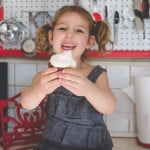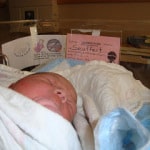I am currently serving as a Smart Play Ambassador with the Minnesota Children’s Museum and each month we explore various topics and share the educational learning opportunities at the museum as well as apply it to our own lives. This month we are exploring the concept of self-control.
Whether it’s words or action, self-control among the preschool crowd is a rare commodity. It seems to be in my house. When I told Stella recently that she wasn’t going to get a Jamba Juice, she promptly responded, “I don’t want to be a part of this family anymore.” I sat there with my jaw dropped, thinking, how did she even know to say something like that? And then, how do I teach her the self-control that you don’t get everything you want? At the Minnesota Children’s Museum, I’ve found that she is very good at taking turns, restraining herself, sharing toys and implementing self-control. Back at home, things are different. I see her snatch toys and the other morning she literally picked up her 10-month-old brother and moved him so he wouldn’t touch her radio. We recently caught her on the video monitor during quiet time on top of her bookshelf. Did I mention she also changed out of her clothes and into a swimsuit?
So how do parents address self-control with their preschoolers? The families below have shared their experiences and then after the stories I’ve included information from the Minnesota Children’s Museum on how we as parents can help teach self-control.
Jenn Dougherty
Child: Archer (almost 4)
A very important first step we took when it came to helping our almost-four-year-old develop his self-control was acknowledging the role that temperament plays in a child’s development. Because of his unique personality traits and style, self-control for Archie might look very different than self-control for one of his peers. [pullquote]Archie has had the most success developing self-control and self-help skills around tasks connected to consistent daily routines that make him feel proud.[/pullquote]Archie has had the most success developing self-control and self-help skills around tasks connected to consistent daily routines that make him feel proud. The three themes that have rang true for us are repetition, practice, and reasonable expectations. Repetition, because young kiddos need things taught to them not one time, but many times. Practice, because once a new concept or idea is introduced, kids need real-world opportunities to develop skills. And finally, reasonable expectations. There are going to be times and/or settings where it will be very difficult for Archie to remember everything that is expected of him or that he is ‘supposed’ to do. For example, large public environments with many kids and loads of activity, but not a great deal of structure. That kind of situation, though loaded with opportunities for practice, is just way too exciting and, at times, overwhelming. That doesn’t mean we avoid those situations, it just means that I need to be proactive in my thinking and expectations when it comes to Archie and self-control. It’s a process, for sure, but it’s also very exciting to watch your little one become more confident and able to take care of him- or herself.
Hue Nguyen
Children: Jacob (3) and Dylan (1.5)
Minnesota Children’s Museum Members
Like many 3 and a half year olds Jacob’s mood can change from happy go lucky to emotional wreck in the matter of moments. Thanks to his preschool teacher, during meltdowns Jacob is able to identify when he needs a break. Often times he will state this aloud himself sometimes you have to ask him. We have designated a couple of spots in the house in which he takes his break 1. His room and 2. A rocking chair. I think it is helpful that these breaks are not seen as punishment but time that he spends by himself to calm himself down. Once he has calmed down he rejoins the rest of the family or whatever activity we were doing. [pullquote]What I’ve learned is that we as parents have to follow through with our promises to our kids.[/pullquote]We were just at the Children’s museum last weekend. Jacob was playing in the water/bubbles area racing the foam boats down the slide. Another little boy came up and took one of the boats Jacob just sent down the slide. At first Jacob yelled at the little boy to give it back, but after his dad explained to him that Jacob needed to share and that it was the other boy’s turn then Jacob could play with it next he calmed down. Another thing we have been working on is taking turns and letting Jacob know that it might be Dylan’s turn (his 1 ½ yr. old brother) now but he will get it back, and make sure he does have another turn. What I’ve learned is that we as parents have to follow through with our promises to our kids.
Jen Minwegen
Children: Aiden (almost 5) and Mason (3)
Minnesota Children’s Museum Members
Self-control at this age can be so challenging! At home, when riding bikes on the driveway, I can tell they both want to continue down the driveway into the street, but they demonstrate self-control by staying on the driveway and avoiding the street. I try to explain to them that the end of the driveway is their boundary, and that they may not go any further. [pullquote]The Minnesota Children’s Museum is a great spot to teach children the importance of self-control. The more they are in charge of their behaviors and limits; the more fun they are going to have![/pullquote] I think that it’s an easier concept for my older son to understand, but I know that my younger son watches his older brother very closely, so I need to make sure he’s setting a good example. When we are at the museum, my almost-5-year-old, and 3-year-old often want to run away and check things out. They practice self-control by staying near me, so they don’t get lost. I know that the environment there can be very exciting to the children. I find it extremely important and essential to show them what their limits are within the museum. It’s an awesome space for kids to explore and use their imagination. The Minnesota Children’s Museum is a great spot to teach children the importance of self-control. The more they are in charge of their behaviors and limits; the more fun they are going to have!
So how do we teach our children self-control, whether it’s at home or at the Minnesota Children’s Museum?
Information from the Minnesota Children’s Museum:
Three and 4-year-olds are just starting to have the mental maturity to consider options outside of what they want. Five and 6-year-olds are practicing….sometimes well, other times not so much! That’s the “normal behavior” parents should expect. Reminding a child of what is appropriate, kind, acceptable, etc. is what parents can do to help their child through a challenging situation. Eventually parents will begin to see their child making those choices on their own, but children continue to work on this for years (and bumps in the road are bound to happen!).












